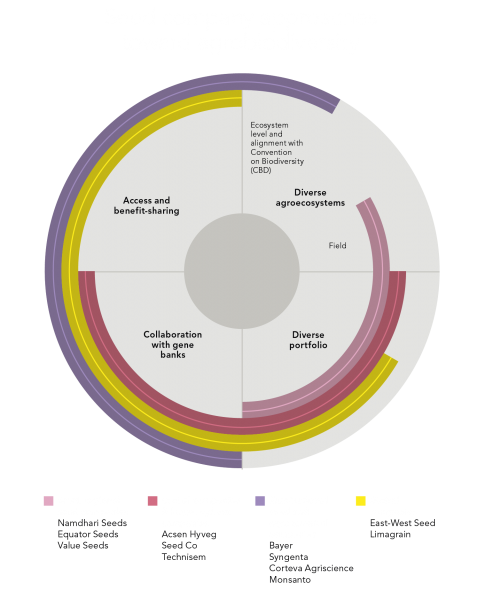Seed companies are highly dependent on the availability of agrobiodiversity, putting significant responsibility on the industry for agrobiodiversity management and use. Agrobiodiversity consists of all components of biological diversity that constitute the agricultural ecosystem in and around farmers’ fields, including the diversity held in gene banks. Farmers’ ability to choose between crops and varieties is important for the provision of diverse diets, for a balanced ecosystem in and around fields and as a basis for future crop and variety development. The relevance of agrobiodiversity for the seed industry is underlined by the fact that all seed companies report having activities or commitments in this area, although differing in scope. These include offering a wide range of crops, among them local crops, varieties and seed types. Companies also report collaborating with gene banks, supporting international treaties on biodiversity conservation and use and contributing to diverse and healthy agroecosystems. While smaller regional seed companies contribute mainly by offering a diverse portfolio, the portfolios of most global companies are a lot less diverse, showing a lack of open-pollinated varieties and local crops. At the same time, global companies, such as Syngenta, Bayer and Corteva Agriscience, lead the industry in providing financial contributions to gene banks within the framework of access and benefit-sharing, and – potentially also as part of their business activities in agrochemicals – initiatives around agroecosystem health and diversity.
Having access to genetics on reasonable terms is essential to maintaining biodiversity and long-term food supply. This is one of the reasons that several global vegetable companies are involved in the International Licensing Platform. Through the platform, member companies guarantee each other access to their intellectual property that covers biological material for vegetable breeding. Biotech products, in particular, but in some countries also varieties, are increasingly protected by patents. This means regular plant variety rights, including the breeders’ exemption, do not guarantee sufficient access to genetic diversity for breeding programs. While originally ‘free access’ meant ‘access for all’ combined with ‘no payment’, the discussion is now moving toward a combination of ‘access for all’ and ‘for a reasonable amount’. As part of this debate, the industry, through the International Seed Federation, is discussing with the Secretariat of the International Treaty on Plant Genetic Resources for Food and Agriculture (ITPGRFA) a global subscription model for the use of genetic resources. This is envisaged to be a longer term and reliable arrangement to accommodate access and benefit-sharing. At the same time, the discussion about patents and breeders’ rights (including the breeders’ exemption) for varieties continues.




